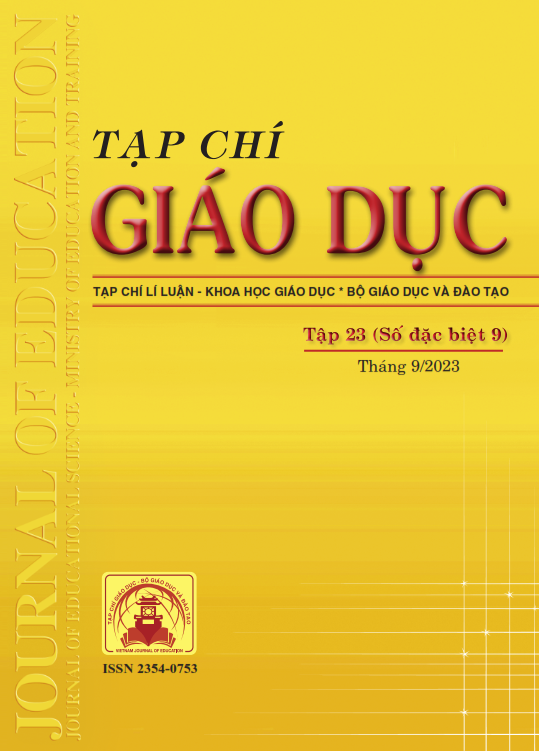Khảo sát sự khác biệt giữa sinh viên Khoa học tự nhiên và Khoa học xã hội trong ứng dụng công nghệ thông tin vào nghiên cứu khoa học: nghiên cứu tại một trường đại học ở Việt Nam
Tóm tắt
Scientific research is one of the basic requirements to improve the quality of university learning. With different specialized characteristics, the needs of students in applying information technology to scientific research in each field are different. This study was carried out using a qualitative method to find out the level of preference and need for using information technology products (including software for searching, analyzing, presenting and promoting research results research) to support student research. In-depth interviews were conducted with students who are participating in scientific research at the university level and above and were divided into two areas: natural sciences and social sciences. The research results show a clear difference between students of the two above major groups. Their skills and purposes of using IT are closely linked to the specifics of their field of study and their previously equipped IT knowledge base. The results of this study have policy implications for improving the efficiency of scientific research for social science students.
Tài liệu tham khảo
Abdulhamed, I. S. (2005). Students attitudes toward the use of Internet and the relationship with their academic achievement: A comparative study between the gender. https://psychology-egypt.150m.com/internetAtt.stud.htm
Abul-Ela, M. R. A. & Shezawi, A. G. B. M. (2004). Internet self-efficacy, attitude toward Internet and self-directed learning skills among students in School of Education in Sohar (Oman). Arab Bureau of Education for the Gulf States. http://www.abegs.org/sites/Research/default.aspx
Akpinar, E., Yıldız, E., Tatar, N., & Ergin, Ö. (2009). Students’ attitudes toward science and technology: an investigation of gender, grade level, and academic achievement. Procedia-Social and Behavioral Sciences, 1(1), 2804-2808.
Aljabri, N. M. R. (2012). The level of applications and the use of computer programs among the university students. Literature Faraaheedi, 12, 459-492.
Chamanlal, J. (2014). Role of computer applications and tools in the scientific research process. Int J Res Sci Technol, 3, 33-44.
Eret, E., Gokmenoglu, T., & Demir, C. E. (2013). A review of research on educational theories and approaches affecting students achievement: 1990-2011. Elementary Education Online, 12(3), 687-700.
Fung, H. P. (2013). Effects of information and communication technology (ICT) on social science research. Africa Development and Resources Research Institute Journal, 1, 1-8.
Ilgan, A. (2013). Predicting college student achievement in science courses. Baltic Science Education and Scientific Research, 12(3), 322-336.
Inoue, Y. (2007). Technology and diversity in higher education new challenges. Hershey, PA: Information Science.
Jarrah, N. B., & Ashour, W. A. S. (2009). Teachers' attitudes towards the use of computer as an educational tool In Iraqi schools. Maysan Magazine for Academic Studies, 8(5), 1-15.
Juma, A. A. R., & Ahmad, B. (2012). The effectiveness of teaching organic chemistry using the ((Web Quest)) strategy on the third stage students achievement in the Faculty of Sciences - University of Sulaymaniyah. El Fath, 49, 62-97.
Lei, J. (2010). Quantity versus quality: A new approach to examine the relationship between technology use and student outcomes. British Journal of Educational Technology, 41(3), 455-472.
Liu, E. Z.-F., Lee, C.-Y., & Chen, J.-H. (2013). Developing a new computer game attitude scale for taiwanese early adolescents. Educational Technology & Society, 16(1), 183-193.
Lukow, J. E. (2005). Students attitudes toward the use of technology in the classroom 1-3. https://www.lsu.edu/departments/the/EProc05/Lukowedit.pdf.
Naibei, P. (2015). Role of ICT, ethical issues and challenges facing social science research (p. 1-8), In Conference ICT and social science research. University of Nairobi.
Schroeder, C. M., Scott, T. P., Tolson, H., Huang, T. Y., & Lee, Y. H. (2007). A meta‐analysis of national research: Effects of teaching strategies on student achievement in science in the United States. Journal of Research in Science Teaching, 44(10), 1436-1460.
Shieh, R. S., Chang, W., & Liu, E. Z. F. (2011). Technology enabled active learning (TEAL) in introductory physics: Impact on genders and achievement levels. Australasian Journal of Educational Technology & Society, 27(7), 1082-1099.
Shukakidze, B. (2013). The impact of family, school, and student factors on student achievement in reading in developed (Estonia) and developing (Azerbaijan) countries. International Education Studies, 6(7), 131-143. https://doi.org/10.5539/ies.v6n7p131
Skryabin, M., Zhang, J., Liu, L., & Zhang, D. (2015). How the ICT development level and usage influence student achievement in reading, mathematics, and science. Computers & Education, 85, 49-58.
Taylor, A. J., & Duran, M. (2006). Teaching social studies with technology: New research on collaborative approaches. The History Teacher, 40(1), 9-25.
Trịnh Thị Hợp (2019). Tìm hiểu một số lí thuyết liên quan đến mô hình chấp nhận công nghệ. Tạp chí Khoa học, Trường Đại học Đồng Tháp, 36, 114-120.
Volk, K., Yip, W.M., & Lo, T.K. (2003). Hong Kong pupils' attitudes toward technology: The impact of design and technology programs. Journal of Technology Education, 15(1), 48-63.
Yusuf, M. O. & Balogun, M. R. (2011). Student-teachers’ competence and attitude towards information and communication technology: A case study in a Nigerian university. Contemporary Educational Technology, 2(1), 18-36.
Đã Xuất bản
Cách trích dẫn
Số
Chuyên mục
Giấy phép

Tác phẩm này được cấp phép theo Ghi nhận tác giả của Creative Commons Giấy phép quốc tế 4.0 .












